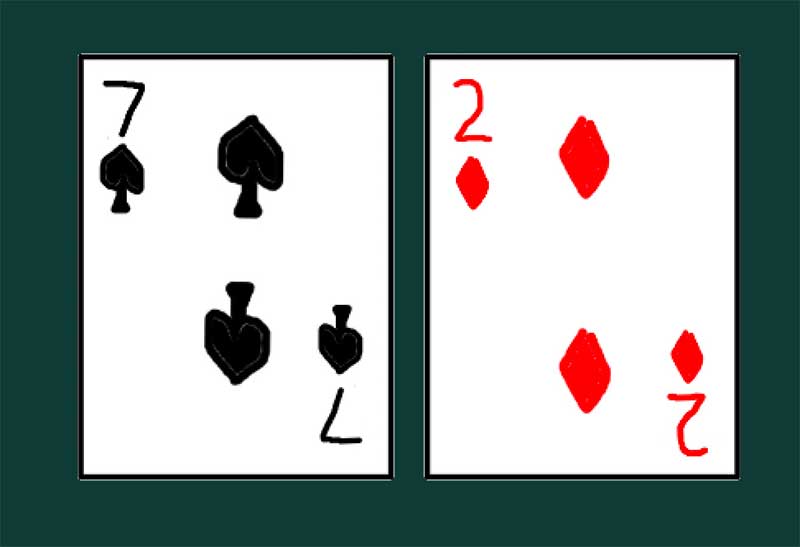In the world of poker, particularly Texas Hold’em, some starting hands are significantly weaker than others. Knowing which hands to avoid can greatly improve your overall game strategy and increase your chances of success. In this guide, we will discuss the worst starting hands in Texas Hold’em poker and provide tips on how to handle them. To maximize your chances of winning in other gambling and betting games, we suggest using our gambling and betting calculators.

The 10 Worst Starting Hands in Texas Hold’em Poker
The following hands are considered the worst starting hands in Texas Hold’em poker:
- 2-7 offsuit
- 2-8 offsuit
- 3-8 offsuit
- 3-7 offsuit
- 2-10 offsuit
- 2-9 offsuit
- 3-9 offsuit
- 4-9 offsuit
- 5-9 offsuit
- 2-6 offsuit
2 and 7
In Texas Hold’em, the 2 and 7 offsuit hand is widely regarded as the worst possible hand in poker. This combination lacks potential, as it offers minimal possibilities for strong hands. It can’t form a straight since there are five cards between 2 and 7, making it nearly impossible to connect with the community cards in a meaningful way. Even if suited, a flush made with these cards would still be weak, and any pairs formed would be low and easily beaten. It’s typically best to fold this hand before the betting begins.
2 and 8
Like the 2-7, a 2 and 8 offsuit hand lacks viability. The 8 offers a slightly higher value than the 7, but it’s still too low to be competitive in most scenarios. Whether suited or not, this hand’s odds of winning are low, as it provides limited straight or flush potential and has weak pairing opportunities. Folding this hand is usually the wisest option unless you’re in an unusual situation that justifies taking a risk.
3 and 8, 3 and 7
Hands like 3-8 offsuit and 3-7 offsuit are considered slightly better than 2-7, but not by much. They’re still among the weakest hands you can have in Texas Hold’em. These hands don’t allow for straights or flushes with ease, and any pairs they form are low-ranking. With a winning rate of just over 4%, playing with these hands is generally unwise. For most players, folding immediately is the right decision.
2 and 10
The 2-10 hand holds a bit of legend, thanks to poker icon Doyle Brunson, who famously won two World Series of Poker championships with it. Despite its fame, it’s still a weak hand for most players. This hand should typically be avoided by all but the most experienced players. Unless you’re an expert or feeling exceptionally lucky, it’s best to fold this hand early in the game.
2 and 9, 3 and 9, 4 and 9
The 2-9, 3-9, and 4-9 hands are among the worst in Texas Hold’em due to their limited potential for improvement. Offsuit hands like these have low win rates, averaging around 4.5-4.7%. Since these hands can’t make strong straights or flushes, you’re left with only a 9 as your highest card, which is weak in most cases.
5 and 9
Known as the “Dolly Parton” due to the song “9 to 5,” the 9 and 5 offsuit hand is fun to play in friendly games but lacks serious competitive strength. Statistically, this hand performs poorly and is unlikely to yield strong winning hands. Playing this hand solely for its nickname or cultural reference usually ends in disappointment, so fold it if you’re aiming to play seriously.
2 and 6
The 2 and 6 offsuit hand offers no potential for a straight and would only make a low flush if suited. If you’re dealt this hand, it’s usually best to cut your losses early and avoid investing further in the round.
Tips for Playing the Worst Starting Hands in Texas Hold’em
Although the worst starting hands in Texas Holdem should almost always be folded, there are rare situations where you may be forced to play them—or where using them strategically can create value. Here are practical, battle-tested tips for handling these weak starting hands while minimizing losses and maximizing any occasional upside.
- Fold more often: If you are dealt a poor hand, don’t stick with it hoping to improve it. Be willing to fold more often, no matter how good it was when it was dealt or how much money you have put into the pot.
- Avoid chasing draws: When you have a weak starting hand, it’s tempting to try to improve it by chasing draws. However, this strategy can be costly and lead to poor decision-making. Instead, focus on playing strong hands and avoid getting involved in pots with weak starting hands.
- Pay attention to position: Your position at the table can greatly impact your ability to make profitable decisions. Being in a late position allows you to observe your opponents’ actions and make better decisions based on their play. If you have a weak starting hand, consider folding early to avoid getting involved in a pot with stronger hands.
- Observe your opponents: Pay attention to how your opponents play their starting hands. This can provide valuable information about their tendencies and help you make better decisions when you have a weak hand.
- Develop discipline: Discipline is crucial in poker, especially when it comes to folding weak starting hands. Learn to recognize when you have a substandard hand and be willing to let it go, even if it means missing out on potential profits.
Knowing the worst hands in Texas Holdem poker and how to handle them is essential for improving your overall game strategy. By folding more often, avoiding chasing draws, paying attention to position, observing your opponents, and developing discipline, you can increase your chances of success at the poker table. Remember, it’s better to fold a weak hand early and live to fight another day than to stubbornly hold onto it and risk losing valuable chips.

